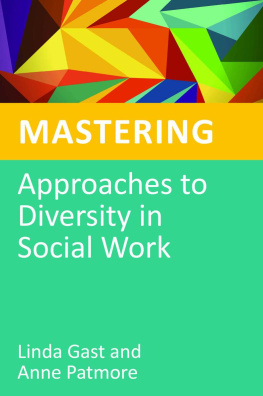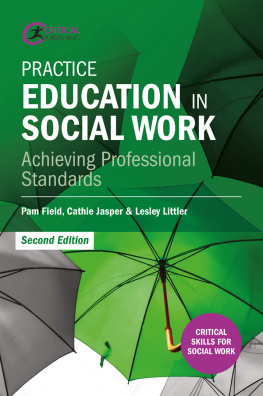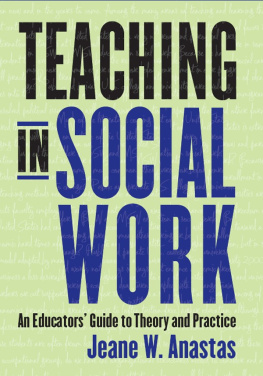CONFRONTING PREJUDICE
Confronting Prejudice
Lesbian and gay issues in social work education
Janette Logan
Sheila Kershaw
Kate Karban
Sue Mills
Joy Trotter
Margo Sinclair
First published 1996 by Ashgate Publishing
Published 2017 by Routledge
2 Park Square, Milton Park, Abingdon, Oxon, OX14 4RN
711 Third Avenue, New York, NY 10017, USA
Routledge is an imprint of the Taylor & Francis Group, an informa business
Copyright Janette Logan, Sheila Kershaw, Kate Karban, Sue Mills, Joy Trotter and Margo Sinclair 1996
All rights reserved. No part of this book may be reprinted or reproduced or utilised in any form or by any electronic, mechanical, or other means, now known or hereafter invented, including photocopying and recording, or in any information storage or retrieval system, without permission in writing from the publishers.
Notice:
Product or corporate names may be trademarks or registered trademarks, and are used only for identification and explanation without intent to infringe.
British Library Cataloguing in Publication Data
Confronting prejudice: lesbian and gay issues in social work education
1. Social service and sex 2. Discrimination in employment 3. Gays Employment
I. Logan, Janette
361.30866
Library of Congress Catalog Card Number: 9685237
Typeset in Palatino by Raven Typesetters Ltd, Chester.
ISBN 13: 978-1-85742-360-0 (pbk)
ISBN 13: 978-1-85742-359-4 (hbk)
I have pleasure in providing the foreword to this publication, highlighting as it does an important and often neglected area within social work education and practice.
CCETSWs equal opportunities policy (adopted in 1989) stated that the Central Council for Education and Training in Social Work will seek to ensure that in all dimensions of its activity as an employer, validating body, and in its development work individuals are not unfairly disadvantaged on the grounds of age, gender, disability, language (including sign language), race, ethnic origin, nationality, sexual orientation, social class or religion. A revised equal opportunities policy statement was approved in May 1995.
Early in 1993 a piece of work was commissioned to make a reality of this commitment in respect to sexual orientation. This led to a report to CCETSWs education and training group, which made a number of recommendations.
One of these was that regional offices should be encouraged, through their equal opportunities action plans, to develop the sharing of good practice, and support the development of practical resources with others in their region.
Simultaneously, a programme to promote good practice in the teaching of child care in the Diploma in Social Work was being undertaken in CCETSWs Northern England office. An opportunity arose to link the two activities.
Following a series of workshops which took place between 1993 and 1994, a group of social work teachers and practitioners emerged, committed to raising the profile of lesbian and gay sexuality within social work education. The group developed proposals for this publication, with advisory help from this regional office, and applied to us for funding. I am happy that we were able to support them.
I commend this publication to you. It is intended to be a practical resource for all those involved in working with social work students. At the same time it will, I hope, stimulate debate and encourage a real acknowledgement of the needs of lesbian and gay students, educators and service users.
Brenda Toward, Head
Northern England CCETSW
January 1996
We are indebted to many colleagues, students and service users who have contributed both directly and indirectly to the material included in this publication.
We are particularly aware that we have not been able to find sources for all of the training material used. The spirit in which we have approached this book is one based on the view that materials need to be shared in order to develop sound anti-oppressive strategies which are owned by everyone.
We would like to thank Ruth Hall from CCETSW Northern England for her support and encouragement and tireless scrutiny to detail throughout the whole process.
Thank-you to Jackie Gilchrist, Wendy Marshall, John Hancox, Steve Myers and Sue Payne for their particular contributions.
Thank-you to Elaine Sammon for her endless patience in typing and re-typing this publication.
Thank-you to CCETSW for commissioning the publication and particularly to Brenda Toward (Head of CCETSW Northern England), for her continued support.
Thank-you to readers.
In writing this book, we acknowledge that as a group of white non-disabled women some lesbian, some heterosexual we are a narrowly representative group and therefore do not reflect the diversities within contemporary society.
We do, however, acknowledge the need to recognise the complexities, connections and tensions of oppression and believe that no one area of oppression can be understood in isolation from all others, as Audre Lorde has said:
To deal with one without even alluding to the other is to distort our commonality as well as our difference. (Lorde, 1984, p. 70)
Lesbian and gay issues cannot, therefore, be explored and understood in isolation from gender, religion, disability class, race, and age. Our approach in addressing the issues is thus set within this wider context which recognises the inter-connectedness and non-hierarchical nature of the various forms of oppression.
Essentially our approach seeks to celebrate and value difference and the rich contribution it makes to our lives.
Anti-oppressive practice Seeking to empower service users and colleagues by recognising and challenging inequalities and oppression in all aspects of social work.
Bisexual A man or woman who may have primary sexual and emotional relationships with either men or women. The term describes the individual, and not the relationship.
Closet A term used by lesbians and gay men to denote that they are not able to be open about their identity in some or all aspects of their lives.
Come out A term used by lesbians and gay men to mean being open about their identity in a particular situation, or more generally in their lives.
Discrimination A word which has been used to denote any kind of choice or selection. It has more recently become a term to denote policy, practice or behaviour which is based on unfair treatment or prejudice shown to individuals or groups.
Gay Derives from the twelfth century French Provenal word Gai meaning courtly love between two men. The word is gender specific; however, it is sometimes used to describe both men and women who relate to people of the same sex. Lesbians often prefer to describe themselves separately. The term describes the persons identity, not the relationship.
Gender Socially ascribed definition placed on male and female to create masculine and feminine.






